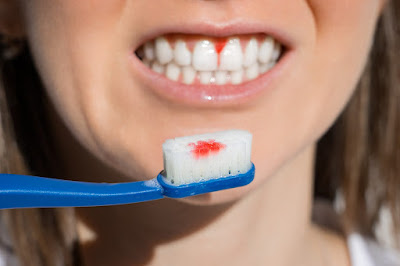Bleeding gums usually mean inflamed gums. In itself nothing
to worry about, but it can become annoying in the long run and even painful
over time until teeth and molars can become loose. Eventually, the teeth may
even be lost.
The main culprit is poor oral hygiene in general and dental
plaque in particular.
Inflamed or not?
How do you recognize inflamed gums, except that they can
bleed regularly? Having foul breath and a bad taste can also indicate gum
inflammation and poor oral hygiene. Normally, the gums have a nice pink color,
but if they are inflamed, they can turn red and appear slightly swollen. Often
the gums also feel more sensitive in case of inflammation.
Causes
Billions of bacterial microorganisms live in our mouths. If
these are not combated by proper oral hygiene, plaque will form and, after a
while, bleeding gums. If the inflammation spreads throughout the mouth, even
the cartilage can be affected.
Combat dental plaque
Dental plaque is the whitish-yellow layer on the teeth, an
accumulation of bacteria, food residues and oral mucus. Dental plaque is
prevented by brushing the teeth several times a day in combination with regular
flossing. Ragers also often want to offer help, and a good mouthwash is really
not superfluous.
If dental plaque converts to tartar by not removing it
enough and regularly, it must be removed through the dentist. For teeth
whitening or tooth
decay cleaning services in Arlington visit Virginia dental clinic.
Prevention is better than cure.
As always, prevention is better than cure. Daily brushing is
the message, and use tools to fight the bacteria and prevent dental plaque.
Proper daily oral hygiene prevents inflamed and bleeding gums in the long term.

Comments
Post a Comment